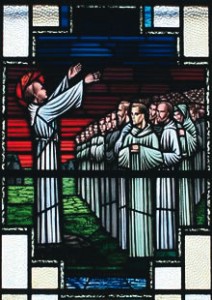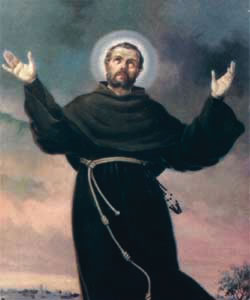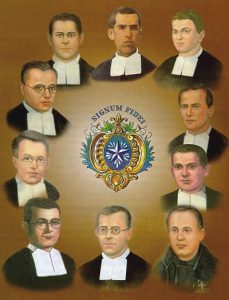Saints for September
 Saint Finian (d. 549)
Saint Finian (d. 549)
To propagate the work of God, St. Finian established several monasteries and schools; the chief of which was Clonard, in Meath, which became known as “the teacher of the saints of Ireland”. Finian was chosen and consecrated bishop of Clonard and became an exemplary pastor to his flock. At the same time he continued his missionary work. He died in 549.
Saint Finian, teach us to be a Christian example in our modern world.
(Source: A new dictionary of saints. Comp. by Donald Attwater. Burns & Oates, Kent 1993)
 Saint Joseph of Cupertino (1603-1663)
Saint Joseph of Cupertino (1603-1663)
Joseph Desa was born in Cupertino in 1603. After some difficulty – as a youth he was not ‘bright’ – he was received by the Conventual Franciscans as a lay tertiary servant. In 1625 he was admitted the novitiate and eventually professed.
He read with difficulty and wrote with still more difficulty. He desired to be a priest but knew well only one text of the Gospel. By a special Providence of God, that was the text he was asked to expound during the canonical examination.
Ordained in 1628, he retired to a hermitage where he was apparently in nearly continuous ecstasy, or at least contemplation. Rejoicing to be totally poor, he felt entirely free also. At the church he was a priest; elsewhere, a poor Brother.
Toward the end of his life all divine consolations were denied the Saint, including his ecstasies. Later, all his joy returned, even in his multiple afflictions. He died in 1663.
Saint Joseph, teach us to trust God to help us to carry out his will.
(Source: A new dictionary of saints. Comp. by Donald Attwater. Burns & Oates, Kent 1993)
 Holy Martyrs of Asturias (d 1934)
Holy Martyrs of Asturias (d 1934)
In 1918, the owners of a coal mining company in Turon had decided to found a school of the children of the workers and entrusted to the de la Salle Brothers. The school opened in 1919 and became a well-loved institution in the town until the political ferment of the 1930s. In 1933, a law was promulgated forbidding members of religious congregations to engage in teaching. The Brothers were withdrawn but, faced with exile or adaptation, the Superior of the Brothers’ Institute in Spain decided on the latter. They returned to the school wearing secular clothing and known by their secular names. No one was deceived, and one of the local anticlerical Masons remarked, “They are the same dogs but with different collars”
The Brothers in Turon numbered eight. Three of their number were still under temporary vows. The school was an irritant to the radicals in charge of the town as the Brothers were known to defy the ban on teaching religion and they openly escorted their students to Sunday Mass.
On the first Friday of October 1934, the Brothers arose as usual at 4.40am and assembled in the chapel. At about six o’clock, A Brother answered a persistent knocking at the door. It was the housekeeper of the parish priests who told them the revolution had begun and that her husband, her son and the three priests had been arrested. She begged the Brothers to flee. After some hesitation, the Brothers decided that flight was unrealistic and decided to proceed at once with the Mass.
The local authorities of the communist-led rebel forces broke into the Brothers’ residence, on the pretext that there were arms hidden on the premises. Father Innocencio de la Immaculada, a Passionist, was offering Mass with the Brothers when they heard the noise outside. To save the Blessed Sacrament, he distributed all the consecrated hosts and the Brothers retired to their rooms to quietly await the outcome. He and all the members of the community were arrested and accused of ‘corrupting minds’.
The communists took the prisoners to the People’s House Communist Party headquarters, where they were kept for four days without explanation. On October 9, before dawn, the Brothers and Father Innocencio were taken to Turon’s cemetery and summarily shot without even so much as a mock trial, giving witness in their death to the faith they had so courageously professed and so effectively communicated to their students.
The Spanish historian Vicente Carcel Orti wrote of their deaths: “The martyrs of Turon were not victims of an act of war or of political repression. They were victims of plain religious hatred that would turn into a systematic policy of murders for two years.”
Holy Martyrs of Asturias, obtain for us courage when our faith is challenged.
 Entries(RSS)
Entries(RSS)